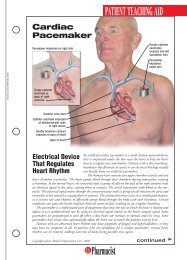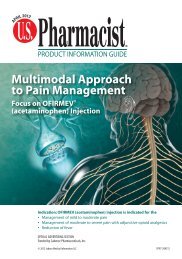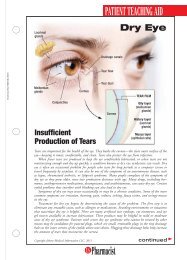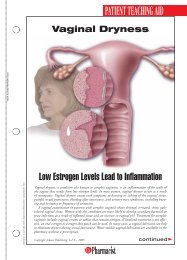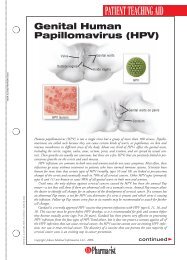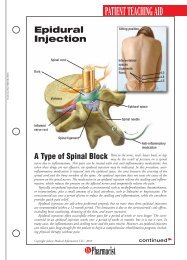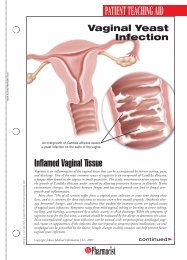View PDF Edition - U.S. Pharmacist
View PDF Edition - U.S. Pharmacist
View PDF Edition - U.S. Pharmacist
Create successful ePaper yourself
Turn your PDF publications into a flip-book with our unique Google optimized e-Paper software.
EMERGENCY CONTRACEPTION: AN UPDATEsure women that changes in menses, while common,are self-limiting. Women can be advised to obtain follow-upcare if menses does not occur within sevendays of the expected onset date or, for women withirregular menses, within three weeks after using EC.Emergency contraceptives are less effective and aremore costly than routine methods of contraceptionand thus should not be relied upon as an ongoingmethod of contraception. Contraceptive use is neededfor future acts of intercourse if pregnancy is not desired.Women may resume the use of barrier or oral contraceptivesright away after taking EC.The pharmacist should be aware that using EC reducesthe risk of pregnancy but does not provide protectionfrom sexually transmitted infections (STIs). When requested,the pharmacist should be prepared to make referral toclinics or health care providers that provide testing andtreatment for STIs. The use of condoms for protectionfrom STIs should be encouraged, when applicable.<strong>Pharmacist</strong>s may advise consumers to keep EC productsat home and available in case of a contraceptivefailure. Keeping EC at home may be more convenientFrequently Asked Questions (FAQ) About Emergency ContraceptionA Reference for <strong>Pharmacist</strong>sWho can use levonorgestrel foremergency contraception (EC)?Levonorgestrel can be used by women after unprotectedintercourse to prevent pregnancy. Women who arealready pregnant or who have experienced an allergicreaction to a levonorgestrel-containing product in thepast should not use this form of EC. Women with ahistory of migraine headaches, smokers over age 35, orother contraindications to the use of combination oralcontraceptives may use EC. EC should not be used bywomen who are already pregnant because it is noteffective. If EC is taken by a woman who is alreadypregnant or becomes pregnant after taking EC, it will notharm the fetus or disrupt the pregnancy. Women whoare pregnant should consult a health care provider.How effective is levonorgestrel for EC?Plan B and Plan B One-Step have been shown to reduce therisk of pregnancy by up to 89% when taken within 3 days(72 hours) of a contraceptive failure or unprotectedintercourse. If taken within the first 24 hours afterunprotected sex, EC may be more effective. One way toexplain the effectiveness of EC is: if 100 women hadunprotected intercourse during week 2 or 3 of theirmenstrual cycle and no contraception was used, eightwomen would be expected to become pregnant. If all 100women used EC, only one woman would be pregnant, thusthere is an 89% reduction in the pregnancy rate (oneinstead of 8 women become pregnant). The effectiveness ofEC for an individual may vary depending on the timing ofintercourse, delay in taking EC, and the inherent fertility ofthe couple.How long should I wait to take EC?For best results, EC should be taken as soon as possibleafter unprotected intercourse or contraceptive failure. ForPlan B and Next Choice, the first tablet (0.75 mglevonorgestrel) should be taken within 72 hours ofunprotected intercourse followed by a second tablet 12hours later. For Plan B One-Step, a single tablet (1.5 mglevonorgestrel) should be taken within 72 hours ofunprotected intercourse. Taking EC as soon as possible ishighly recommended.What if it has been more than 72 hourssince intercourse?Although EC has only been approved for use up to 72 hoursafter unprotected intercourse, the available research indicatesthat levonorgestrel retains significant activity in reducing therisk of pregnancy for at least 120 hours after unprotectedintercourse. 6 While EC is more effective when taken earlier,using it up to 120 hours after intercourse may still preventpregnancy. (Please note that the use of levonorgestrel only ECproducts after 72 hours for EC has not been approved by theFDA.) Users of EC should be aware that the product may beless effective when taken later than 72 hours afterunprotected intercourse.What can I expect after using EC?Most women do not experience side effects from taking EC.Some mild side effects that may occur include: nausea,headache, fatigue, mild abdominal discomfort, or a change inthe timing/bleeding of the next menstrual cycle. These areself-limited and do not require treatment. Most women shouldexpect to have their period within about 1 week of when itwould be expected. If a woman does not menstruate within 3weeks of using EC, she should consult her health careprovider and/or use a home pregnancy test.Is EC also known as the “abortion pill”?No, the “abortion pill,” Mifeprex (mifepristone) or RU486, iscompletely different from EC. Levonorgestrel (the hormone inEC) does not cause an abortion and will not be effective iftaken by a woman who is already pregnant. Similar to oralcontraceptives, EC has been shown to work by preventingovulation. Once implantation of an embryo begins, EC is noteffective.What if I have taken EC more than once?Women may use EC once or more than once depending ontheir regular birth control method and their personalcircumstances. Levonorgestrel for EC is safe and may beused when needed to prevent pregnancy. EC is not aseffective as other methods of contraception (such ascondoms, oral contraceptives) and therefore the routine useof EC is not recommended. EC is intended to be a backupmethod of contraception.75U.S. <strong>Pharmacist</strong> • November 2009 • www.uspharmacist.com



